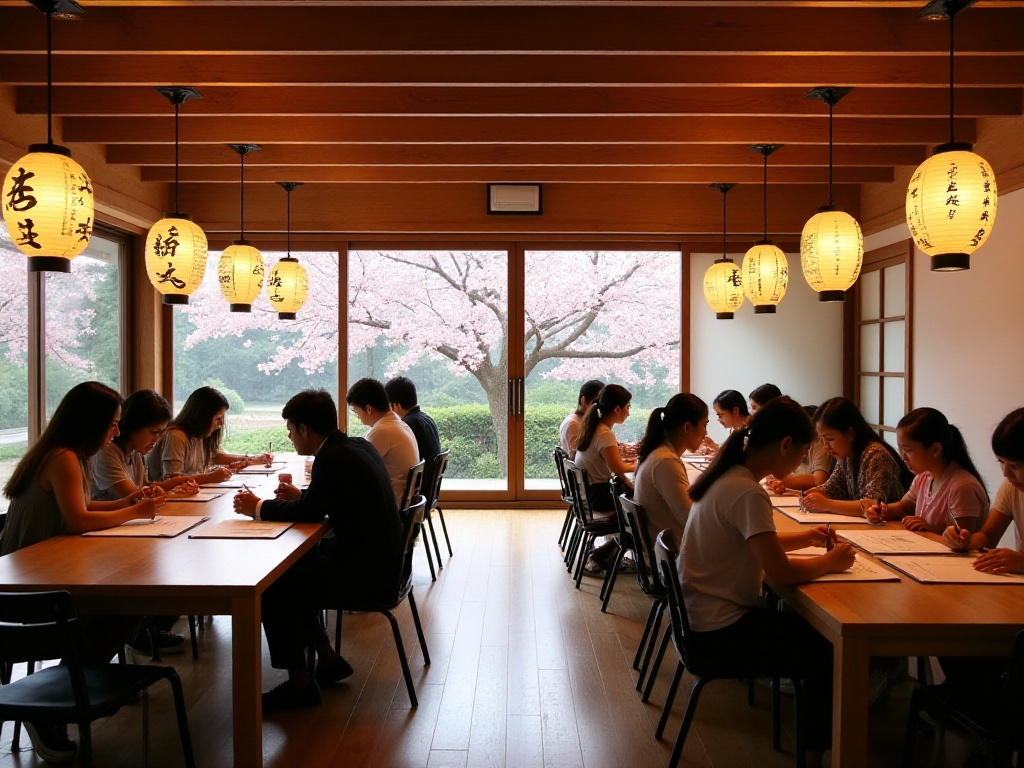
Introduction
I just returned from Japan, feeling my Japanese has improved dramatically. From late December last year to late January this year, I lived in Tokyo for exactly one month. This month of language immersion improved my Japanese ability more than a year of self-study. This leap in progress really excited me and gave me a new perspective on language learning. Honestly, if I hadn't experienced it myself, I wouldn't have believed such significant changes could happen in just one month.
Unexpected Gains
Initially, I went to Japan just to experience the local culture and lifestyle. Surprisingly, the biggest gain turned out to be my significant language improvement. I'll never forget how helpless I felt when I first arrived in Tokyo. I was nervous just buying onigiri at convenience stores, afraid the clerk would ask if I wanted it heated - back then I only knew "hai" (yes) and "iie" (no).
The change after one month was amazing. I could discuss parenting with my landlady and Japanese economics with izakaya owners. Once, I had a conversation with a slightly tipsy businessman about his company's overtime culture, and I could completely follow along and express my own views. At that moment, I truly felt the joy of breakthrough.
My landlady often praised my rapid progress, saying she was surprised how I went from stumbling through simple daily conversations to fluently expressing my thoughts. She mentioned that many foreigners who stay in Japan short-term, even for half a year, don't necessarily show noticeable improvement in their Japanese, while I made such progress in just one month, which must have taken great effort.

The Power of Environment
During this month in Japan, I deeply realized the importance of language environment. Honestly, a year of memorizing Japanese vocabulary and grammar in China might not be as effective as living in Japan for one month. Why? Because in Japan, you're forced to think and express yourself in Japanese, and this pressure drives rapid improvement.
From buying breakfast at convenience stores in the morning to ordering food at izakayas at night, you're practicing Japanese every moment. You need Japanese to buy a sandwich, ask for directions, watch TV, listen to radio, and even read subway advertisements. This constant language stimulation keeps your brain in "Japanese mode."
A linguist friend told me that this immersive learning activates the brain's language acquisition mechanism, accelerating the language mastery process. She explained that when we're in the target language environment, our brain unconsciously mobilizes all neurons related to language learning, forming an efficient language learning network. It's like suddenly falling into water - to survive, you must learn to swim, and learn quickly.
The changes brought by the environment are comprehensive. For instance, when studying in China, I always focused on grammatical correctness, mentally checking sentences before speaking. But after living in Japan, I found myself focusing more on natural and authentic expression. I would observe how Japanese people express themselves in various situations and learn from them.
Once at a supermarket, I heard a housewife asking about a product's price using "sumimasen, kore tte oikura desu ka," which sounds much more natural than the textbook "ikura desu ka." Since then, I started paying attention to these authentic expressions from daily life, and gradually my Japanese became more colloquial.

Practical Techniques
So, how can you maximize language learning effects during a stay abroad? I've summarized several particularly useful methods that I've personally practiced.
First, actively create conversation opportunities. Many people are afraid to speak because of their poor language skills, but this is backwards thinking. In Japan, I deliberately chose a highly-rated Airbnb with a very talkative landlady. Every morning when I met her, I would initiate conversation, ranging from weather to food, from parenting to workplace culture.
Once, when she mentioned her daughter was worried about university entrance exams, I took the opportunity to discuss Japan's education system. Although I often made mistakes while speaking, she would patiently correct me. For example, when I said "benkyou ga taihen desu," she told me that using "taihen" in this context sounded a bit stiff, and "kitsui" would be more natural. Such immediate corrections and feedback are particularly helpful for improving language accuracy.
Second, make good use of multimedia resources. I would watch NHK morning news every day and watch Japanese dramas in the evening. These contents not only help improve listening skills but also help you understand the latest slang and social topics. Through watching news, I learned words like "bukka kouto" (price inflation), which I could use in conversations with locals.
Watching Japanese dramas is also a great way to learn. I particularly enjoy workplace dramas because they contain many practical business Japanese expressions. For example, through watching "I Want to Leave the Office on Time," I learned many office phrases like "osaki ni shitsurei shimasu" (I'm leaving first) and "otsukaresama desu" (good work). Plus, the situational dialogues in Japanese dramas are particularly vivid, helping you understand what expressions to use in different situations.
Third, record and review promptly. I created a special folder in my phone's notes to record new words and expressions I learned each day. For instance, when I heard a restaurant server say "shoushou omachi kudasai" (please wait a moment), I immediately noted it down and could use it when visiting other restaurants later.
My recording method is simple - besides the word or sentence itself, I also note down the usage context and speaker's tone. This helps me use these expressions more accurately when needed. For example, for "otsukaresama desu," I would note: used between colleagues for greetings, can be used both when meeting and parting, tone should be friendly but not too casual.
To make learning more efficient, I developed my own review system. I spend 15 minutes before bed reviewing new content learned that day, review again after waking up the next morning, and then do a comprehensive review after a week. This ensures the new knowledge truly becomes my own.

Unexpected Discoveries
My experience in Japan made me realize that traditional language learning methods might need to change. Rather than burying yourself in grammar books at home, it's better to live in the target country for a while. Research data shows that living in the target language environment for one month equals 3-6 months of study at home. This data completely matches my personal experience.
I discovered that in actual language environments, many grammar points we consider difficult aren't really so. For example, Japanese honorific language (keigo) always seemed particularly difficult when studying in China, considering the speaker's status and the formality of situations. But after living in Japan, I found that using keigo actually follows very clear patterns.
In convenience stores, clerks use honorific expressions like "goriyou arigatou gozaimasu" (thank you for your patronage); in companies, juniors say "otsukaresama desu" to seniors; in restaurants, servers say "gochuumon wa ijou de yoroshii deshou ka" (would that be all for your order?). These are fixed situations with fixed honorific expressions. Through repeated exposure to these situations, using keigo gradually becomes a conditioned reflex.

Deep Thoughts
This experience also gave me new insights into language learning. Language isn't just a communication tool, but also a key to understanding culture. Through daily conversations, I learned many Japanese cultural details that can't be found in textbooks.
For example, when Japanese people say "onegaishimasu" at convenience stores, it's not just "please" but also shows respect for service providers. Saying "gochisousama deshita" after a meal isn't just "thanks for the meal" but also expresses gratitude to those who prepared the food. These subtle language habits reflect Japanese society's emphasis on etiquette and mutual respect.
In interactions with locals, I also deeply experienced the social function of language. For instance, in izakayas, if you use authentic Japanese expressions like "kore, umai!" (this is delicious!) instead of textbook "oishii desu," you can immediately close the distance with Japanese people. Language isn't just a tool for conveying information but also a bridge for building interpersonal relationships.

Future Outlook
This residential experience gave me great inspiration. I wonder if this model could be expanded? For example, planning a three-month language learning trip: first month focusing on language use in daily situations, second month attending local language courses, third month trying to integrate into local community activities.
The first month is mainly about adapting to the environment, developing language sense, and building basic communication skills. This stage focuses on overcoming psychological barriers and daring to speak Japanese. The second month supplements grammar and vocabulary deficiencies through systematic course study, making Japanese expression more accurate and standard. The third month involves participating in community activities like book clubs, tea ceremony classes, and cooking classes to deepen understanding of Japanese culture while improving Japanese authenticity.
I believe this learning approach not only quickly improves language skills but also provides deeper understanding of the target language country's culture. In today's globalized world, such cross-cultural understanding and communication abilities are particularly important.
Finally, I want to say there are no shortcuts in language learning, but choosing the right learning methods and environment can make the learning process twice as effective with half the effort. If you also want to improve your language skills, try this immersive learning approach. I believe you'll also experience unexpected progress in a short time, just like I did.
Next
Learning Languages in Foreign Lands: An Immersive Experience Shared by a Travel Blogger
Explore the dynamic relationship between travel and language learning, examining how immersion enhances language skills and how linguistic abilities deepen travel experiences through cultural engagement and authentic interactions
One Person's Language Journey: Measuring the World with Footsteps, Making Travel the Best Language Classroom
Explore effective methods and benefits of learning languages through travel, combining immersive strategies with practical approaches, supported by digital tools and structured resources for enhanced language acquisition and personal growth
One Person's Language Learning Journey: My 90-Day Immersion Experience in a Rural Japanese Town
Explore how travel facilitates language learning through immersive environments, covering natural and structured learning methods, along with guidance on choosing suitable language programs and courses to enhance language skills while traveling
Next

Learning Languages in Foreign Lands: An Immersive Experience Shared by a Travel Blogger
Explore the dynamic relationship between travel and language learning, examining how immersion enhances language skills and how linguistic abilities deepen travel experiences through cultural engagement and authentic interactions

One Person's Language Journey: Measuring the World with Footsteps, Making Travel the Best Language Classroom
Explore effective methods and benefits of learning languages through travel, combining immersive strategies with practical approaches, supported by digital tools and structured resources for enhanced language acquisition and personal growth

One Person's Language Learning Journey: My 90-Day Immersion Experience in a Rural Japanese Town
Explore how travel facilitates language learning through immersive environments, covering natural and structured learning methods, along with guidance on choosing suitable language programs and courses to enhance language skills while traveling



